Mentors
We are currently recruiting mentors for 2024. In the meantime, check out our mentors from 2022.
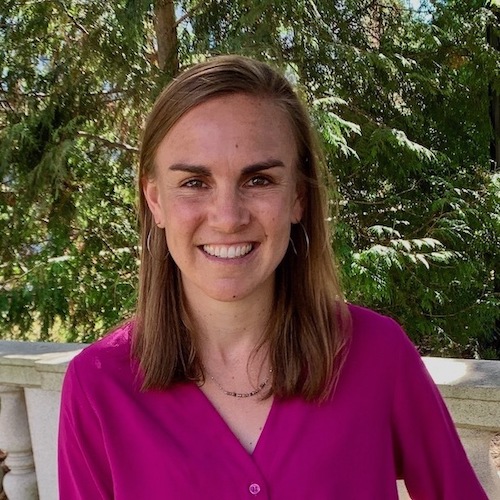 Cara Brook is an Assistant Professor in the Department of Ecology and Evolution at the University of Chicago. She received her B.S. in Earth Systems from Stanford University in 2010, and her M.Sc. and Ph.D. in Ecology and Evolutionary Biology from Princeton University in 2014 and 2017, respectively, in the lab of Professor Andy Dobson. While at Princeton, Brook pioneered a longterm fruit bat field system in Madagascar, which she maintains to this day. From 2017-2020, she was Miller Postdoctoral Fellow in the lab of Professor Mike Boots at the University of California, Berkeley, and in 2020, she was awarded a Loréal USA For Women in Science fellowship and a Branco Weiss Society in Science fellowship, which she began at Berkeley and transitioned to her current faculty job at U-Chicago.
Cara Brook is an Assistant Professor in the Department of Ecology and Evolution at the University of Chicago. She received her B.S. in Earth Systems from Stanford University in 2010, and her M.Sc. and Ph.D. in Ecology and Evolutionary Biology from Princeton University in 2014 and 2017, respectively, in the lab of Professor Andy Dobson. While at Princeton, Brook pioneered a longterm fruit bat field system in Madagascar, which she maintains to this day. From 2017-2020, she was Miller Postdoctoral Fellow in the lab of Professor Mike Boots at the University of California, Berkeley, and in 2020, she was awarded a Loréal USA For Women in Science fellowship and a Branco Weiss Society in Science fellowship, which she began at Berkeley and transitioned to her current faculty job at U-Chicago.
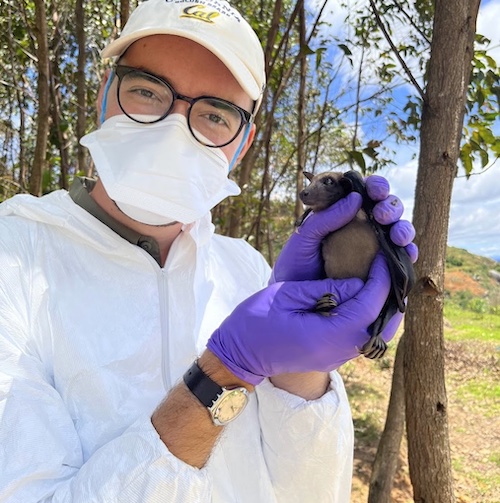 Dominic Daniels is a Field Project Manager for Ekipa Fanihy in Madagascar, where he co-facilitates field missions for the sampling of Pteropus, Eidolon, and Rousettus bats. His side projects include bioacoustics sampling for insectivorous bats and GIS mapping. Dominic holds a B.S. in Conservation & Resource Studies and a B.A. in French from the University of California, Berkeley; and has previously worked for the Lincoln Park Zoo, the US Bureau of Land Management, and CAL FIRE.
Dominic Daniels is a Field Project Manager for Ekipa Fanihy in Madagascar, where he co-facilitates field missions for the sampling of Pteropus, Eidolon, and Rousettus bats. His side projects include bioacoustics sampling for insectivorous bats and GIS mapping. Dominic holds a B.S. in Conservation & Resource Studies and a B.A. in French from the University of California, Berkeley; and has previously worked for the Lincoln Park Zoo, the US Bureau of Land Management, and CAL FIRE.
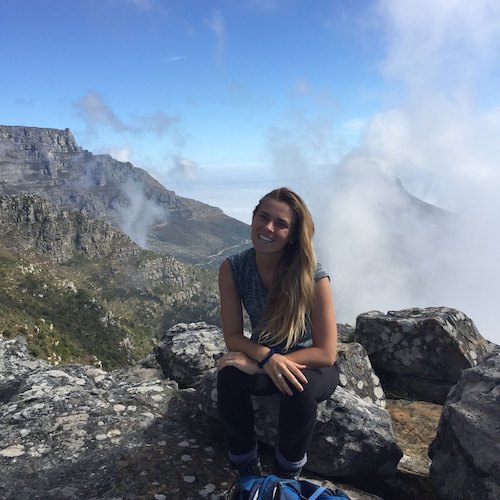 Kendall Fitzgerald is a Field Project Manager with Ekipa Fanihy. She co-leads tri-monthly field missions with the team to carry out monthly capture and sampling of Madagascar fruit bats. She will also serve as an in-country facilitator for the new “Coding for Conservation” mentorship program for Malagasy students. Additionally, Kendall documents media for the lab through film, blogs and images. Kendall holds a Bachelor of Arts degree from UC Berkeley in Evolution, Ecology and Organismal Biology and she previously studied identification of subfossil sub-saharan African shrews as well as conducted field work in South Africa, Malawi and California.
Kendall Fitzgerald is a Field Project Manager with Ekipa Fanihy. She co-leads tri-monthly field missions with the team to carry out monthly capture and sampling of Madagascar fruit bats. She will also serve as an in-country facilitator for the new “Coding for Conservation” mentorship program for Malagasy students. Additionally, Kendall documents media for the lab through film, blogs and images. Kendall holds a Bachelor of Arts degree from UC Berkeley in Evolution, Ecology and Organismal Biology and she previously studied identification of subfossil sub-saharan African shrews as well as conducted field work in South Africa, Malawi and California.
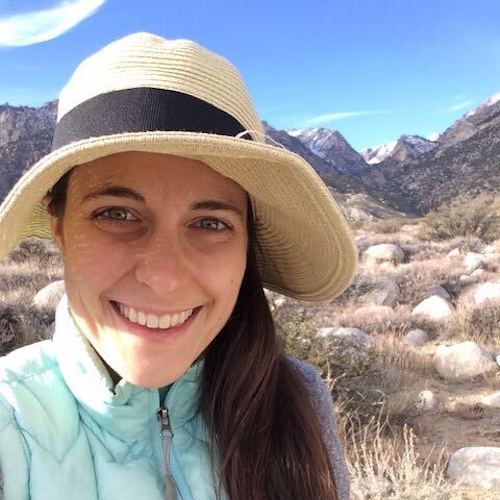 Katie Gostic is a Computational Staff Scientist in Dr. Sarah Cobey’s lab in the Department of Ecology and Evolution at the University of Chicago. She received her AB in Ecology and Evolutionary Biology from Princeton, and a PhD in Biology from the University of California Los Angeles (UCLA) where she was advised by Dr. Jamie Lloyd-Smith. She received a Complex Systems Postdoctoral Fellowship from the James S. McDonnell Founation to study development of the adaptive immune repertoire to influenza viruses. Her research uses models and data collected from various scales (populations, individuals, or within-host) to study the emergence, evolution, and control of novel pathogens.
Katie Gostic is a Computational Staff Scientist in Dr. Sarah Cobey’s lab in the Department of Ecology and Evolution at the University of Chicago. She received her AB in Ecology and Evolutionary Biology from Princeton, and a PhD in Biology from the University of California Los Angeles (UCLA) where she was advised by Dr. Jamie Lloyd-Smith. She received a Complex Systems Postdoctoral Fellowship from the James S. McDonnell Founation to study development of the adaptive immune repertoire to influenza viruses. Her research uses models and data collected from various scales (populations, individuals, or within-host) to study the emergence, evolution, and control of novel pathogens.
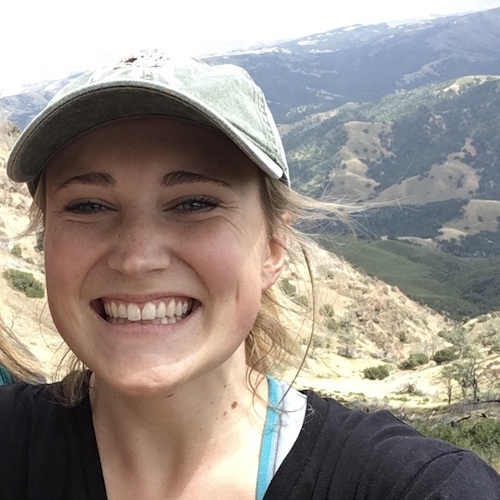 Sophia Horigan is a PhD Candidate in Dr. Cara Brook’s lab in the Department of Ecology and Evolution at the University of Chicago. She received her B.A. in Biology from Lewis & Clark College in 2016, and her M.Sc. from the University of Chicago in 2021, where she was advised by Dr. Greg Dwyer. Before entering graduate school, she worked as a lab technician at Lewis & Clark College, a teaching assistant for a study abroad trip to Australia, and a science educator in the Tech Museum in San Jose, California. Sophia is a field and computational ecologist who combines data and models to understand and predict disease dynamics, with a particular interest in asking questions at the intersection of public health, environmental health, and animal conservation. For her Master’s thesis, she examined the role of spatial mechanisms in the population dynamics of an invasive lepidopteran infected by multiple pathogens. In the Brook lab, she will be using models to inform a strategic vaccination campaign against henipaviruses in bats with the goal of reducing the potential for zoonotic spillover.
Sophia Horigan is a PhD Candidate in Dr. Cara Brook’s lab in the Department of Ecology and Evolution at the University of Chicago. She received her B.A. in Biology from Lewis & Clark College in 2016, and her M.Sc. from the University of Chicago in 2021, where she was advised by Dr. Greg Dwyer. Before entering graduate school, she worked as a lab technician at Lewis & Clark College, a teaching assistant for a study abroad trip to Australia, and a science educator in the Tech Museum in San Jose, California. Sophia is a field and computational ecologist who combines data and models to understand and predict disease dynamics, with a particular interest in asking questions at the intersection of public health, environmental health, and animal conservation. For her Master’s thesis, she examined the role of spatial mechanisms in the population dynamics of an invasive lepidopteran infected by multiple pathogens. In the Brook lab, she will be using models to inform a strategic vaccination campaign against henipaviruses in bats with the goal of reducing the potential for zoonotic spillover.
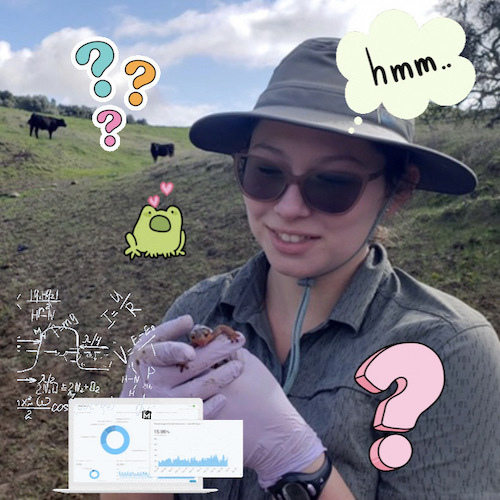 Tatum Katz is a Postdoctoral fellow for the USDA Agricultural Research Service and Scientific Computing Initiative to use artificial intelligence to predict and prevent Salmonella in the meat supply chain. She received her B.A. in Biology from Occidental College in 2017. She recieved her M.A. in Applied Statistics in 2021, and her PhD in Ecology, Evolution, and Marine Biology in 2022, both from the University of California Santa Barbara. Her PhD focused on investigating reservoirs and vectors of the amphibian-killing chytrid fungus Batrachochytrium dendrobatidis using field work, laboratory experiments, and quantitative methods.
Tatum Katz is a Postdoctoral fellow for the USDA Agricultural Research Service and Scientific Computing Initiative to use artificial intelligence to predict and prevent Salmonella in the meat supply chain. She received her B.A. in Biology from Occidental College in 2017. She recieved her M.A. in Applied Statistics in 2021, and her PhD in Ecology, Evolution, and Marine Biology in 2022, both from the University of California Santa Barbara. Her PhD focused on investigating reservoirs and vectors of the amphibian-killing chytrid fungus Batrachochytrium dendrobatidis using field work, laboratory experiments, and quantitative methods.
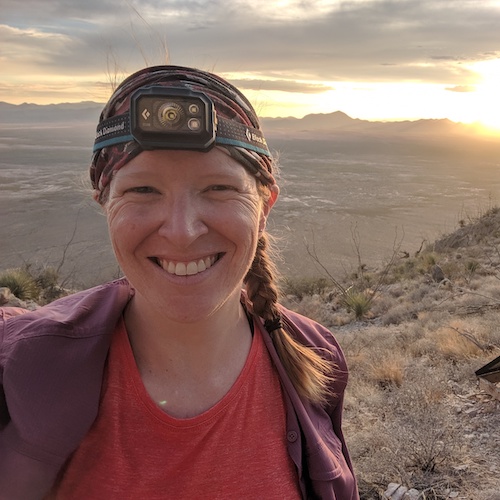 Theresa Laverty is a Postdoctoral Scholar in Dr. Cara Brook’s lab in the Department of Ecology and Evolution at the University of Chicago. She received her B.A. in Ecology and Evolutionary Biology from Princeton University in 2010, and her Ph.D. in Fish, Wildlife, and Conservation Biology from Colorado State University in 2019, where she was advised by Dr. Joel Berger. She held a postdoctoral position at Colorado State University under the supervision of Dr. Kathryn Stoner before joining the Brook lab in 2021. Theresa’s a field ecologist and conservation biologist who has studied species as diverse as crocodilians, beach-nesting birds, mountain gorillas, and African elephants. For the last nine years, she has largely focused on the population and community ecology of bat communities in the deserts of northwestern Namibia and the southwestern United States, and currently in forest ecosystems in Madagascar as a member of the Brook lab.
Theresa Laverty is a Postdoctoral Scholar in Dr. Cara Brook’s lab in the Department of Ecology and Evolution at the University of Chicago. She received her B.A. in Ecology and Evolutionary Biology from Princeton University in 2010, and her Ph.D. in Fish, Wildlife, and Conservation Biology from Colorado State University in 2019, where she was advised by Dr. Joel Berger. She held a postdoctoral position at Colorado State University under the supervision of Dr. Kathryn Stoner before joining the Brook lab in 2021. Theresa’s a field ecologist and conservation biologist who has studied species as diverse as crocodilians, beach-nesting birds, mountain gorillas, and African elephants. For the last nine years, she has largely focused on the population and community ecology of bat communities in the deserts of northwestern Namibia and the southwestern United States, and currently in forest ecosystems in Madagascar as a member of the Brook lab.
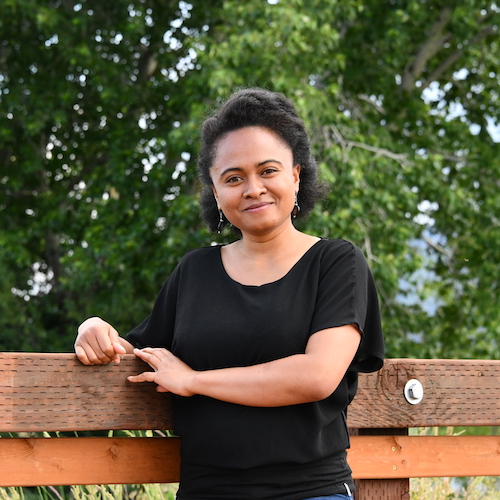 Adelaide Miarinjara scientific career is dedicated to studying the entomological aspect of plague disease, and her research interests are focusing on understating the ecological and environmental factors modulating the ability of flea species to transmit the plague bacterium. Currently she is a postdoc at Gillespie’s lab at Emory University. Before that she held a first postdoctoral position at the Plague Section of the Rocky Mountain Laboratory, National Institute of Allergy and Infectious Diseases. Under the supervision of Dr. Joseph Hinnebusch, she studied the mechanisms of flea-borne transmission of Yersinia pestis, the plague bacterium.She received a Ph.D. degree in Medical Entomology in 2017 from the University of Antananarivo, Madagascar. She was part of the Medical Entomology Unit of the Institut Pasteur de Madagascar, where she conducted various research on plague disease such as flea taxonomy, phylogeny, vector control, and insecticide resistance. She started as a master’s student intern in 2012, as a Ph.D. student in 2014, and now as a research collaborator.
Adelaide Miarinjara scientific career is dedicated to studying the entomological aspect of plague disease, and her research interests are focusing on understating the ecological and environmental factors modulating the ability of flea species to transmit the plague bacterium. Currently she is a postdoc at Gillespie’s lab at Emory University. Before that she held a first postdoctoral position at the Plague Section of the Rocky Mountain Laboratory, National Institute of Allergy and Infectious Diseases. Under the supervision of Dr. Joseph Hinnebusch, she studied the mechanisms of flea-borne transmission of Yersinia pestis, the plague bacterium.She received a Ph.D. degree in Medical Entomology in 2017 from the University of Antananarivo, Madagascar. She was part of the Medical Entomology Unit of the Institut Pasteur de Madagascar, where she conducted various research on plague disease such as flea taxonomy, phylogeny, vector control, and insecticide resistance. She started as a master’s student intern in 2012, as a Ph.D. student in 2014, and now as a research collaborator.
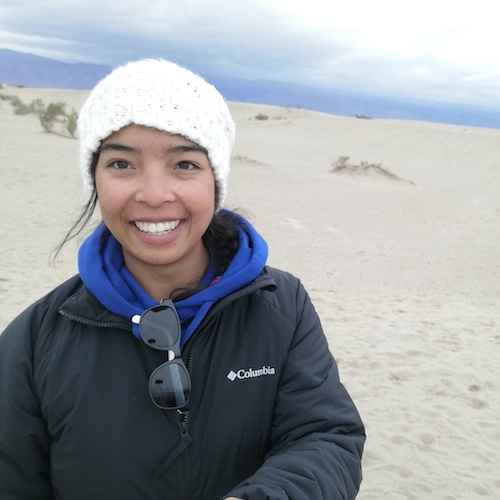 Veronarindra Ramananjato, Vero for short, is a PhD candidate in Dr. Razafindratsima’s lab. She has a MS in Animal Conservation Biology from the University of Antananarivo (Madagascar) and is currently working on her PhD project at the University of California Berkeley. Her project aims to provide insights on the seed dispersal effectiveness of nocturnal and omnivorous species and use such knowledge to inform solutions for their conservation in a changing world. She addressed this by focusing on mouse lemurs in Madagascar’s rainforests and the effects of habitat fragmentation on their seed dispersal services. Vero has also interests in plant-animal interactions and their eventual applications for biodiversity conservation.
Veronarindra Ramananjato, Vero for short, is a PhD candidate in Dr. Razafindratsima’s lab. She has a MS in Animal Conservation Biology from the University of Antananarivo (Madagascar) and is currently working on her PhD project at the University of California Berkeley. Her project aims to provide insights on the seed dispersal effectiveness of nocturnal and omnivorous species and use such knowledge to inform solutions for their conservation in a changing world. She addressed this by focusing on mouse lemurs in Madagascar’s rainforests and the effects of habitat fragmentation on their seed dispersal services. Vero has also interests in plant-animal interactions and their eventual applications for biodiversity conservation.
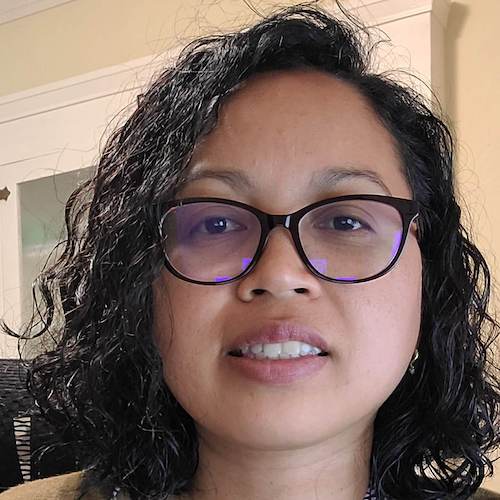 Onja Razafindratsima is an Assistant Professor in Integrative Biology at the University of California, Berkeley. A Malagasy ecologist and a National Geographic Explorer, Onja is passionate about tropical ecology and conservation with a strong focus on plant-animal interactions, lemur ecology and seed dispersal. Onja earned a PhD in Ecology and Evolutionary Biology from Rice University and was later a Hrdy Fellow in Conservation Biology at Harvard University.
Onja Razafindratsima is an Assistant Professor in Integrative Biology at the University of California, Berkeley. A Malagasy ecologist and a National Geographic Explorer, Onja is passionate about tropical ecology and conservation with a strong focus on plant-animal interactions, lemur ecology and seed dispersal. Onja earned a PhD in Ecology and Evolutionary Biology from Rice University and was later a Hrdy Fellow in Conservation Biology at Harvard University.
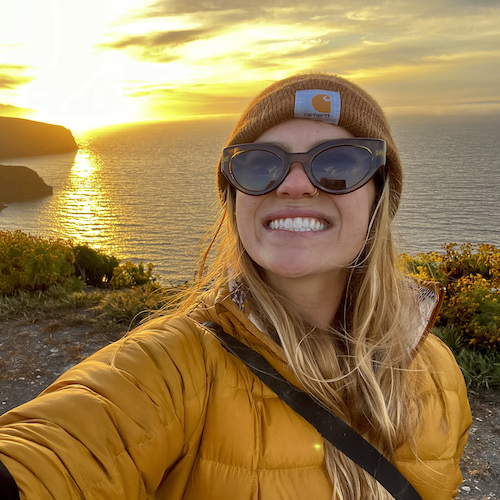 Kacie Ring is a PhD student in Dr. Cherie Briggs lab in the EEMB Department at UCSB. She received her B.S. in Ecology and Evolutionary biology from UCSC and her M.S. in Microbiology at SFSU advised by Dr. Andrea Swei. At SFSU, she studied how host blood meal alters vector comptency in the western black-legged ticks. Her current interests include how land-use change, such as deforestation, fragmentation and restoration, impacts vector-borne diseases.
Kacie Ring is a PhD student in Dr. Cherie Briggs lab in the EEMB Department at UCSB. She received her B.S. in Ecology and Evolutionary biology from UCSC and her M.S. in Microbiology at SFSU advised by Dr. Andrea Swei. At SFSU, she studied how host blood meal alters vector comptency in the western black-legged ticks. Her current interests include how land-use change, such as deforestation, fragmentation and restoration, impacts vector-borne diseases.
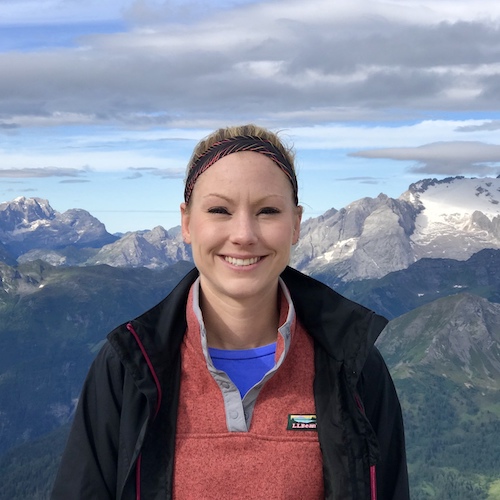 Emily Cornelius Ruhs is a Postdoctoral Scholar in Dr. Cara Brook’s lab in the Department of Ecology and Evolution at the University of Chicago. She received her B.S. in Zoology from Michigan State University in 2011, her M.S. in Ecology from the University of Georgia in 2013 where she was advised by Drs. Sonia Altizer and Andrew Davis, and her Ph.D. in Wildlife Ecology from the University of Wisconsin-Madison in 2017, where she was advised by Dr. Bill Karasov. She held a short-term research fellowship at the Université du Quebéc à Rimouski, a contractor position at USGS, and a postdoctoral position at the University of South Florida before joining the Brook lab in 2021. Emily is both a field and experimental ecologist who focuses on how energetic constraints (e.g. food availability, reproduction, migration) impacts immune function and disease in a suite of taxonomic groups including birds, primates, and now bats. In the Brook lab she works on how nutritional status, reproduction, and seasonality influence immune function and disease dynamics in three species of fruit bats in Madagascar.
Emily Cornelius Ruhs is a Postdoctoral Scholar in Dr. Cara Brook’s lab in the Department of Ecology and Evolution at the University of Chicago. She received her B.S. in Zoology from Michigan State University in 2011, her M.S. in Ecology from the University of Georgia in 2013 where she was advised by Drs. Sonia Altizer and Andrew Davis, and her Ph.D. in Wildlife Ecology from the University of Wisconsin-Madison in 2017, where she was advised by Dr. Bill Karasov. She held a short-term research fellowship at the Université du Quebéc à Rimouski, a contractor position at USGS, and a postdoctoral position at the University of South Florida before joining the Brook lab in 2021. Emily is both a field and experimental ecologist who focuses on how energetic constraints (e.g. food availability, reproduction, migration) impacts immune function and disease in a suite of taxonomic groups including birds, primates, and now bats. In the Brook lab she works on how nutritional status, reproduction, and seasonality influence immune function and disease dynamics in three species of fruit bats in Madagascar.
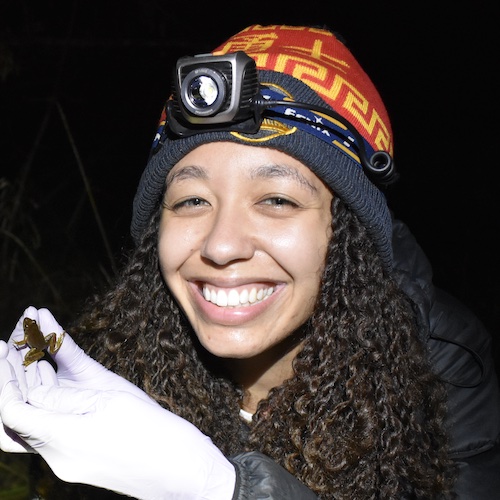 Imani Russell is a PhD candidate working with Dr. Cherie Briggs at the University of California Santa Barbara. She completed her B.S. in Biology and Ecological Theory at Mills College in Oakland, where she studied social behavior and ectoparasite transmission in California ground squirrels with Dr. Jennifer E. Smith. She completed her M.S. at the University of Michigan in Ecology and Evolutionary Biology, where she researched ecological predictors of Bd infection across lowland Amazonian frog species with Drs. Alison Davis-Rabosky and Timothy James. Imani is currently studying how host-parasite genetic interactions vary across California to produce the patterns of disease dynamics observed in nature.
Imani Russell is a PhD candidate working with Dr. Cherie Briggs at the University of California Santa Barbara. She completed her B.S. in Biology and Ecological Theory at Mills College in Oakland, where she studied social behavior and ectoparasite transmission in California ground squirrels with Dr. Jennifer E. Smith. She completed her M.S. at the University of Michigan in Ecology and Evolutionary Biology, where she researched ecological predictors of Bd infection across lowland Amazonian frog species with Drs. Alison Davis-Rabosky and Timothy James. Imani is currently studying how host-parasite genetic interactions vary across California to produce the patterns of disease dynamics observed in nature.
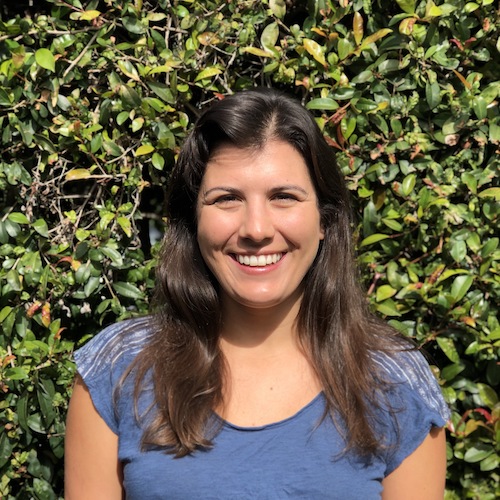 Sam Sambado is a PhD Candidate in Cherie Briggs & Andy MacDonald lab groups at University of California Santa Barbara (UCSB). She received a BS in Biology at University of California Los Angeles, a MS in Microbiology at San Francisco State, and is currently working on her MA in Statistics at UCSB. Her main interests are connecting the impacts of climate change with the spread of vector-borne diseases using field, molecular, and quantitative techniques. Samantha’s PhD dissertation aims to link ecosystems to genes to better predict human disease outcomes in the tick system using publicly available data and statistical modeling.
Sam Sambado is a PhD Candidate in Cherie Briggs & Andy MacDonald lab groups at University of California Santa Barbara (UCSB). She received a BS in Biology at University of California Los Angeles, a MS in Microbiology at San Francisco State, and is currently working on her MA in Statistics at UCSB. Her main interests are connecting the impacts of climate change with the spread of vector-borne diseases using field, molecular, and quantitative techniques. Samantha’s PhD dissertation aims to link ecosystems to genes to better predict human disease outcomes in the tick system using publicly available data and statistical modeling.
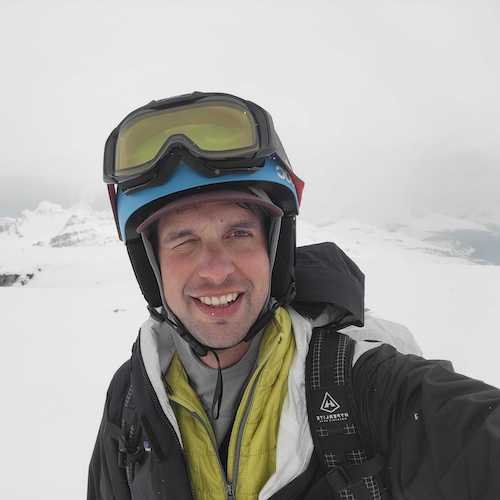 Timothy Treuer is a recent Gund Postdoctoral Fellow at the University of Vermont. He completed a bachelor’s degree in organismic and evolutionary biology at Harvard and a doctorate in ecology and evolutionary biology at Princeton. His research looks at how nature-based climate solutions can have impacts on biodiversity and human wellbeing. With the support of a Spark Award from the Bridge Collaborative, his recent research in Madagascar looked at how forest restoration and agroforestry could be used as tools to simultaneously address habitat loss, rural poverty, air and water quality, and mosquito-born disease risk. He is currently based in Alaska, where he writes about a number of topics in tthe sciences, primarily for Regeneration.org.
Timothy Treuer is a recent Gund Postdoctoral Fellow at the University of Vermont. He completed a bachelor’s degree in organismic and evolutionary biology at Harvard and a doctorate in ecology and evolutionary biology at Princeton. His research looks at how nature-based climate solutions can have impacts on biodiversity and human wellbeing. With the support of a Spark Award from the Bridge Collaborative, his recent research in Madagascar looked at how forest restoration and agroforestry could be used as tools to simultaneously address habitat loss, rural poverty, air and water quality, and mosquito-born disease risk. He is currently based in Alaska, where he writes about a number of topics in tthe sciences, primarily for Regeneration.org.
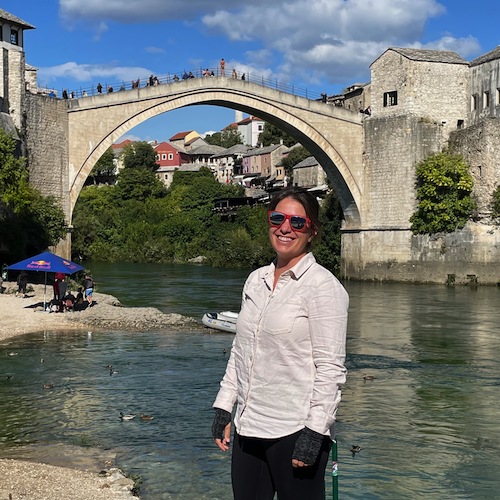 Katie Young is a Postdoctoral Scholar in Dr. Cara Brook’s lab in the Department of Ecology and Evolution at the University of Chicago. She received her B.S. in Biology from Longwood University in 2008, followed by two years of service, 2009 - 2011, as a Peace Corps Volunteer in Kenya. She received her M.S. and PhD in Biology from New Mexico State University in 2015 and 2019 where she was advised by Dr. Kathryn Hanley. She was awarded a Fulbright Fellowship to Malaysian Borneo in 2016. She was a USDA funded Postdoctoral fellow working on a Grand Challenge Project in Mexico and New Mexico from 2019 to 2022 before joining the Brook lab. Katie is an RNA virus ecologist with a focus on arthropod-borne viruses and uses an inter-disciplinary approach including field-based sampling, molecular biology, and open-source data analytics to better understand complex host-vector-environmental interactions that drive viral emergence in Madagascar.
Katie Young is a Postdoctoral Scholar in Dr. Cara Brook’s lab in the Department of Ecology and Evolution at the University of Chicago. She received her B.S. in Biology from Longwood University in 2008, followed by two years of service, 2009 - 2011, as a Peace Corps Volunteer in Kenya. She received her M.S. and PhD in Biology from New Mexico State University in 2015 and 2019 where she was advised by Dr. Kathryn Hanley. She was awarded a Fulbright Fellowship to Malaysian Borneo in 2016. She was a USDA funded Postdoctoral fellow working on a Grand Challenge Project in Mexico and New Mexico from 2019 to 2022 before joining the Brook lab. Katie is an RNA virus ecologist with a focus on arthropod-borne viruses and uses an inter-disciplinary approach including field-based sampling, molecular biology, and open-source data analytics to better understand complex host-vector-environmental interactions that drive viral emergence in Madagascar.
Thanks to our support staff! …
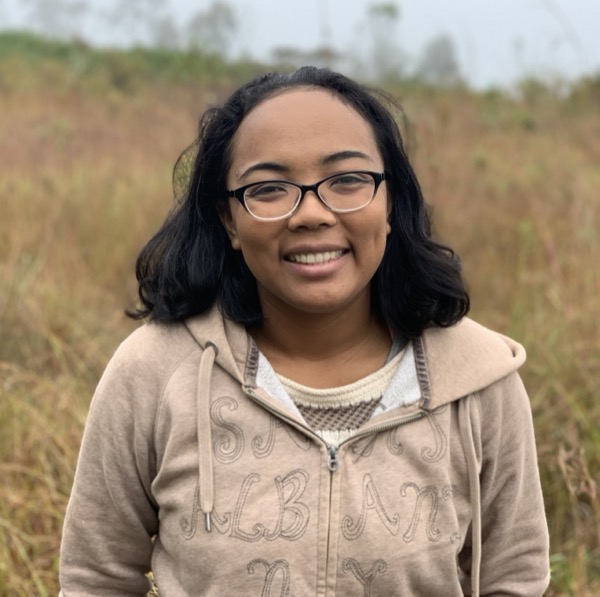 Fifi Ravelomanantsoa is a member of Ekipa Fanihy and a student in the Department of Zoology and Animal Biodiversity at the University of Antananarivo, Madagascar, where she is studying seasonal variation in microbiome gut flora in Malagasy fruit bats and the interactions of these microbiome communities with the dynamics of viral and bacterial infections. Fifi's review of the zoonotic potential of bat-borne coronaviruses was recently published in Emerging Topics in Life Sciences. Fifi holds a Master's degree in Animal Conservation from the University of Antananarivo and has previously studied patterns in chiropteran biodiversity in the Melaky region of western Madagascar. She is helping to coordinate the office hours and data supply for C4C.
Fifi Ravelomanantsoa is a member of Ekipa Fanihy and a student in the Department of Zoology and Animal Biodiversity at the University of Antananarivo, Madagascar, where she is studying seasonal variation in microbiome gut flora in Malagasy fruit bats and the interactions of these microbiome communities with the dynamics of viral and bacterial infections. Fifi's review of the zoonotic potential of bat-borne coronaviruses was recently published in Emerging Topics in Life Sciences. Fifi holds a Master's degree in Animal Conservation from the University of Antananarivo and has previously studied patterns in chiropteran biodiversity in the Melaky region of western Madagascar. She is helping to coordinate the office hours and data supply for C4C.
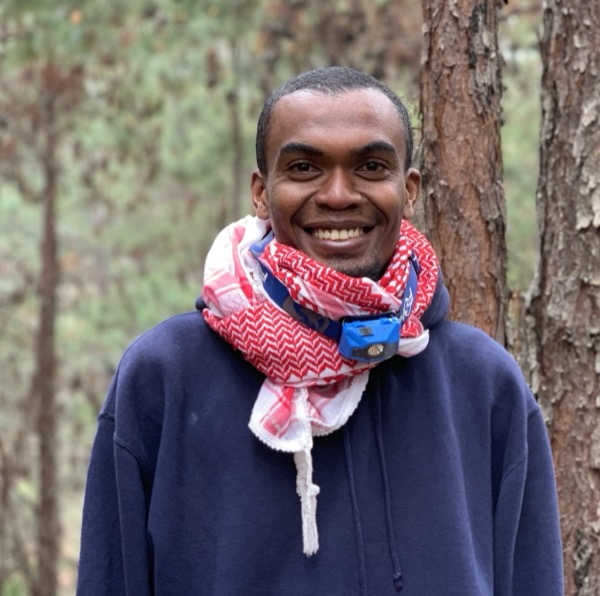 Santino Andry is also a member of Ekipa Fanihy and a student in the Department of Entomology at the University of Antananarivo, Madagascar. He recently finished his Master's degree, where he worked with the Madagascar Biodiversity Center to document the effects of logging intensification on exotic and native ant assemblages in the new protected area of Ambohidray, District of Moramanga, Madagascar. Along with mentee Angelo Andrianiaina, he recently published a life history analysis
of Madagascar fruit bats in the Journal of Mammalogy. Santino is also helping to coordinate the office hours and data supply for C4C.
Santino Andry is also a member of Ekipa Fanihy and a student in the Department of Entomology at the University of Antananarivo, Madagascar. He recently finished his Master's degree, where he worked with the Madagascar Biodiversity Center to document the effects of logging intensification on exotic and native ant assemblages in the new protected area of Ambohidray, District of Moramanga, Madagascar. Along with mentee Angelo Andrianiaina, he recently published a life history analysis
of Madagascar fruit bats in the Journal of Mammalogy. Santino is also helping to coordinate the office hours and data supply for C4C.